How did the full-scale war against Ukraine affect the decolonisation of Russia's other neighbours?
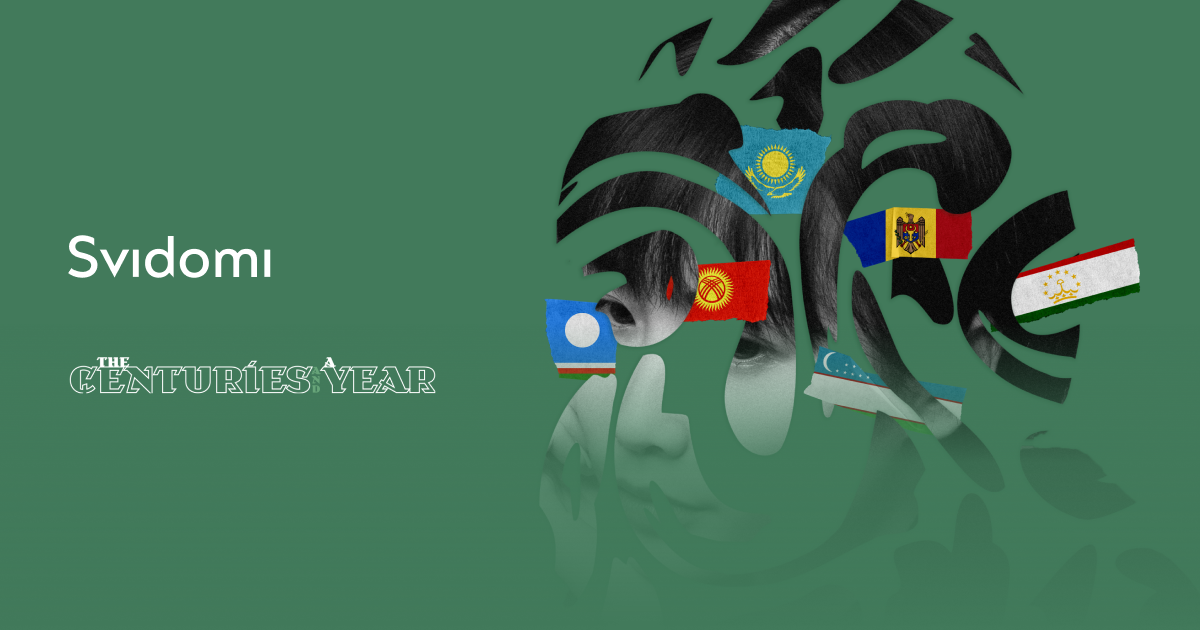
The full-scale invasion caused many transformations in Ukraine, Russia, and neighbouring regions. Seeking to revive the Soviet status of a "super nation", Russia is losing its status as a "great nation."
This does not imply the disappearance of the Russian imperial project anytime soon. On the contrary, not only Ukraine but also neighbouring countries are essential for it. However, the full-scale invasion has also affected processes within other countries.
Svidomi talked to representatives of Moldova, Tojikiston, Qazaqsatan, Uzbek Ŭzbekiston, Kyrgyzstan, and Sakha to discuss whether the situation has changed since the full-scale invasion began and how difficult the process of de-Russification is likely to be.
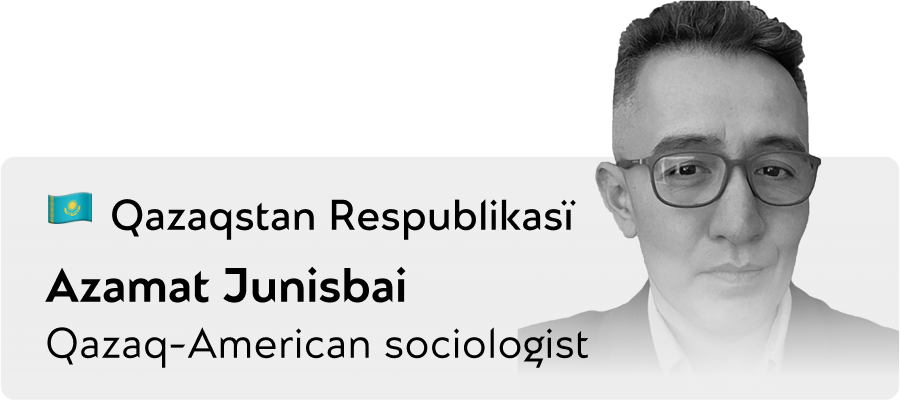
At school, in the early eighties, we studied Qazaq for a few hours a week. Back then, this subject was the only one during which everyone just went about their business. I lived in the capital, in Almaty, and I didn't even have any need to know the Qazaq language. At that time, the ability to speak Russian without an accent was a status marker.
Moreover, Qazaq seemed a village language, the language of uncultured people to me. Russian was enough for me, and I was annoyed by people who criticised me for not knowing Qazaq.
I'm learning the language and memorising new words, but it's a process. For me, it's a real emotional journey. Before I didn't just know this language, I considered it a village language. Now I understand — it was a distorted idea resulting from colonisation. Understanding this, mastering the language is like a political action for me.
Yes, of course, after the start of the full-scale invasion, many people in Qazaqstan began to feel uneasy about using Russian: why do we speak Russian to each other? We are Qazaqs.
The process of de-Russification makes Russian propaganda less effective. It only affects people who consume Russian content. Again, Qazaqstan now has many young people from Qazaq-speaking families. This poison doesn't get into their heads.
My friends and I were Russified. We grew up with Russian culture, Russian books — everything was Russian. And now we realise how twisted it was.
My first wife was American. We had three kids. We gave them Qazaq names. We wanted them to be bilingual. So my wife spoke to them in English. And I... I could give my children only Russian. It is terrible. We had a rule at home: my oldest son could not speak English to me. I was so colonised that for 20 years, I was running around and yelling at my child to speak to me in the language of the colonisers.
There is an understanding in Qazaqstan: it is time to reduce our dependence on Russia. Several people in Qazaqstan told me that the Ukrainians are fighting for us as well. The greater the defeat of Russia, the easier it will be for us to breathe.
We support Ukraine because we understand that we can be in your shoes. In 2014, Putin declared: Qazaqs never had statehood; Nazarbayev created it. Our border with Russia is 7,600 kilometres long. So it's not hard for us to imagine that we will be next. And we have a smaller population, a smaller army. Who knows what is in military warehouses. Perhaps everything has already been sold or stolen.
Now Qazaqstan is in a tricky situation. On one side — Russia; on the other — China. Qazaqstan is trying not to exacerbate the issue of Qazaqs in Xinjiang. The Chinese Communist Party considers Qazaqs savages who must be turned into normal people. There are even re-education camps there. But at the same time, it is an important economic partner.
There is also active economic cooperation with Russia. This is due to the way infrastructure was built, for example, Soviet pipelines. Oil from Qazaqstan goes to refineries in Russia, and Russian oil goes to Qazaqstan. This was done to maximise interdependence. So, Qazaqstan is in a difficult position.
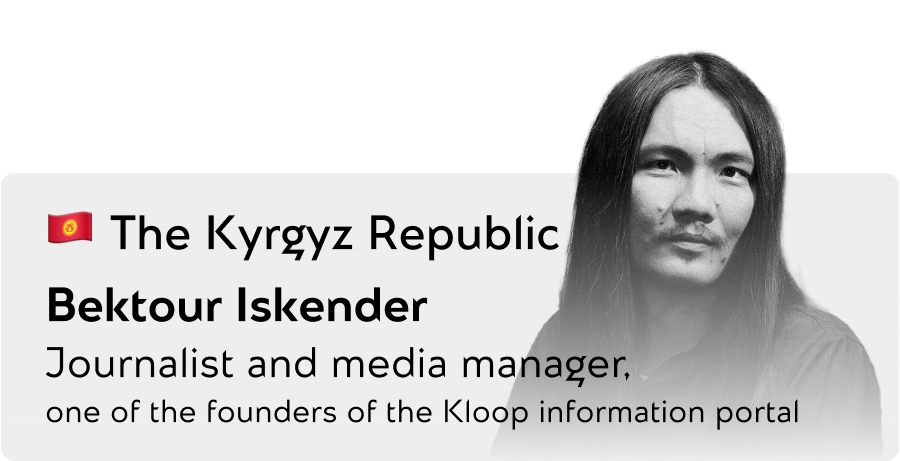
The colonisation of Kyrgyzstan by Russia began in the nineteenth century. Notably, the Kyrgyz and Kazakhs, nomadic peoples, did not have clearly defined borders. So when Russia occupied Kyrgyzstan, we had no statehood as such. And this was a weakness that the Russians pressured us to exploit. We had many tribes, each of which was free and autonomous, and Russia initially did everything to make us quarrel with each other so it was easier to occupy us. In the 1870s, the Russian Empire occupied almost all of Central Asia.
Before the First World War, we could speak our own language and had an agreement that all indigenous peoples of Central Asia would not fight in the Russian army. But in 1916, the occupiers violated this agreement. That was the first serious uprising of indigenous peoples against Russia.
There is hardly any family in Kyrgyzstan that has not been affected by Russian terror. When Soviet power came, people believed in it at first. Many Kyrgyz returned from China, where they were forced to flee the imperial regime.
When the policy of indigenisation was underway, we really felt our autonomy and published books and newspapers in the Kyrgyz language. But when Stalin's terror began, tens of thousands of Kyrgyz were killed and repressed. It is a terrible figure for our small republic.
Then there were several other anti-Soviet movements in Kyrgyzstan, including the Basmachi and Pan-Türkizm movements. But it was forbidden to talk about this, and we began to learn our history only in the late 1980s, during the ‘reconstruction’.
Those several decades of Soviet colonialism and propaganda had such an impact that even after independence, criticising Russia and accusing it of colonialism was considered strange and unnecessary.
The government found itself in an uncomfortable position. On the one hand, we are economically dependent on Russia, and our current president is afraid of it. But, on the other hand, they do not want to be so strongly associated with a country guilty of mass murder and war crimes. Therefore, the position is ambiguous.
For example, the country has banned the "Z" symbol. Still, at the same time, a Ukrainian film about Donetsk and Luhansk regions was cancelled at a film festival, allegedly because it was propagandising the war.
It is the policy of neutrality. In my opinion, being neutral is almost a crime.
Kyrgyz is the most popular language in Kyrgyzstan if we look at the number of people who speak it. But Russian remains the language that grants privileges; Russian is spoken in the capital, where there are opportunities, work and education.
If you speak only Kyrgyz in Kyrgyzstan, your chances of building a successful career are low. And this is a problem, especially if we look at the fact that Russia is directing its propaganda at the Russian-speaking part of the population of Kyrgyzstan.
In the mid-1930s, the Soviet government closed all Kyrgyz-language schools in Bishkek, except for one, where you could not study if you had a Bishkek residence permit. That is, this school functioned as a boarding school for those coming from small towns and villages.
Until 1991, Russian-language schools did not even have such a subject as the Kyrgyz language. The Soviet government did everything to make sure that the Kyrgyz language had an image of being unprestigious. Now, if you want to learn English, which is available only in the capital, you cannot do it without knowing Russian.
Once, when I was older, I tried to speak Kyrgyz with my relatives, and they made fun of me for speaking Kyrgyz with an accent. Later I discovered that many of my friends had similar stories of Kyrgyz-speaking people making fun of those who tried to speak Kyrgyz. We were so ashamed of speaking Kyrgyz badly that we just stopped doing it.
In 2014, I went to the Maidan and Donetsk, where I saw the war begin. For me, this was the moment when I realised that the colonisation of Russia did not end after the collapse of the Soviet Union.
But people are not interested in history and contemporary Russian neocolonialism. They know that the war is near, but they continue to live their lives. Russia remains a big threat to Kyrgyzstan. It's just that many people still don't realise it.
No republic that Russia has attacked has been able to fight back. And then [there was] Ukraine's brave resistance.
If Ukraine hadn't done that, Russia would have attacked all of us because it saw that the world was not responding. The war against Ukraine finally opened our eyes to what Russia was like.
It has protected us from attack and eventually made us take an interest in our history of colonisation. And also start thinking about strengthening solidarity between regions because we have a shared history and traumas.
It is painful to see the price Ukraine is paying for the freedom of all of us. For me, Ukraine is the main decolonising force in Central Asia. We relaxed in the 90s because we thought the Soviet Union had collapsed and the occupation was over. But this is not true. We still have a lot to do.
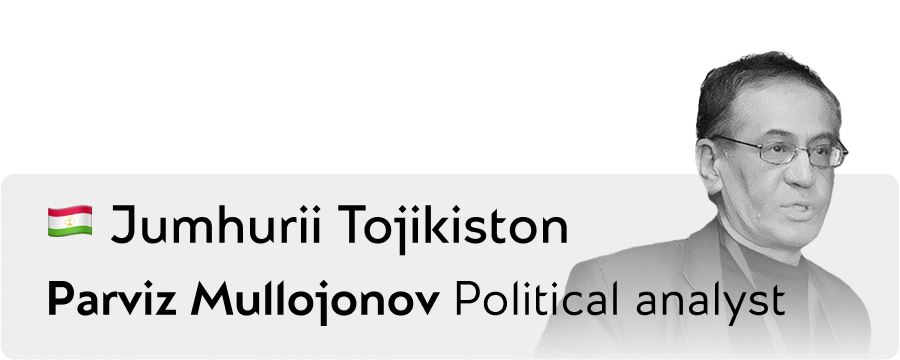
A year after Tojikiston declared its independence, in 1992, the republic broke out in a civil war that effectively made Tojikiston dependent on Russia for the next 15 years. The pro-Russian so-called People's Front won. At the end of the war, a peace agreement was concluded under the auspices of Russia, and virtually all the levers of power were in the hands of the People's Front.
Russia played a huge role in the civil war, and the methodology of "hybrid warfare" used in Ukraine was first practised by Russians in Tojikiston.
Behind the scenes, the issue of an alliance or even Tojikiston's accession to Russia was discussed, as the entire economy was dependent on Russia, the internal war continued for Russian money, and the republic had so-called "peacekeeping" Russian forces.
In the mid-2000s, there was a certain distance between Moscow and Dushanbe. It was since Tojikiston was requesting funding for its mega-projects, such as the construction of hydroelectric power plants and factories. Politicians openly told Russian officials that they had to allocate funds for projects if they wanted to maintain their dominance in the republic.
In 2005-2006, Tojikiston began looking for other funding sources abroad - among Arab countries, China, and the European Union. Already in 2007-2008, the state developed a multi-vector foreign policy strategy, which envisaged that Russia would be the main partner, but the republic was still moving away from it regarding relations with other countries.
Society, as elsewhere in the USSR, was Russified. But in Tojikiston, the capital, Dushanbe, was mostly Russified. The Russian-speaking population here was about 60%. Russification ended with the outbreak of the Civil War. The road to other post-Soviet Russian-speaking countries was open, and most people left.
In fact, it was a blow to the country because the intelligentsia left Tajikistan. Since then, Russian has become the language of a small part of educated people, and the state leadership has begun the complete Tojikization of administrative structures. In 2000-2002, the Russian language finally left official structures.
Russia still has several institutes in Tojikiston that organise seminars, cultural events, and educational conferences. In 2014, when the war broke out in Ukraine, groups from the so-called Eurasia Institute travelled throughout Central Asia, giving lectures and organising seminars on what was happening in Ukraine and what the relationship between Russia and the West was.
They said that after Ukraine, the next area to be destabilised would be Central Asia because America was supposedly going to use these countries to strike at Russia's rear. Propaganda is Russia's main soft power, which it uses against Tojikiston.
After the outbreak of a full-scale war, Russia and Tojikiston remained partners because Tojikiston was interested in Russia's military presence in the republic because of the situation on the border with Afghanistan. Russian military bases are considered a deterrent to the Taliban.
Partnerships remain, but none of the Central Asian republics has publicly expressed their attitude to a full-scale Russian invasion - the press does not cover these topics. Tojikiston is trying to distance itself because, from a geopolitical point of view, it is not profitable to spoil relations with either Russia or the West.
In October 2022, at the Central Asia-Russia summit, Tojikiston's President Emomali Rahmon addressed Vladimir Putin and said there was no need to treat Central Asian countries like the former Soviet Union.
It was a reflection of the discontent of Russia's partners. Officially, the allies of the Collective Security Treaty Organization (CSTO) have an obligation: if one of the countries starts conflicts, it must at least inform its partners. Russia has launched a full-scale invasion without asking anyone, and everyone feels the consequences.
This discontent is evident in the most minor things, such as how Russians are met - their delegations may not be picked up from the airport. Russia is partially withdrawing from the region, it doesn't want to, but since all its attention and resources are focused on the war, its influence on Asia is weakening.
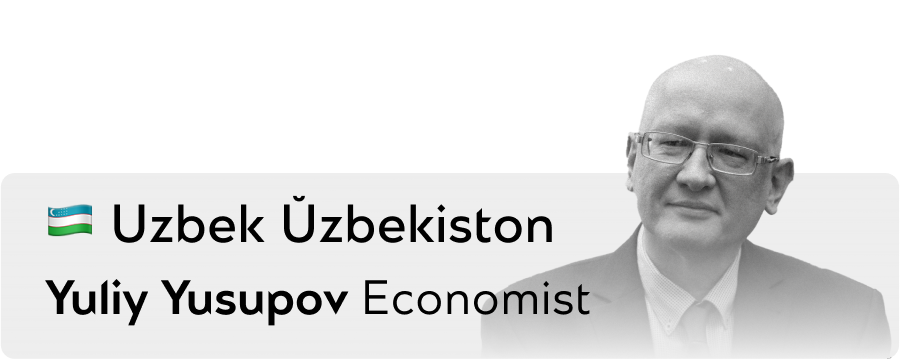
Uzbek Ŭzbekiston is an authoritarian state. Under the first president, Islom Abdugʻaniyevich Karimov, the country had a rather harsh form of authoritarianism. Therefore, "decolonisation" mostly took the form of strengthening Karimov's power, and this was aimed at distancing from Moscow, including some ideological aspects of criticism of the colonial era.
Moreover, some elements of this distancing took place even when Karimov was the first secretary of the Central Committee of the Communist Party of Uzbekistan.
There has been no real decolonisation in Uzbekistan, as nostalgia for the Soviet era is still widespread in the country. Russian propaganda has a significant impact on the population which is freely disseminated, particularly on television.
The most important influence is ideological: through propaganda, whose narratives do not contribute to the formation of legal thinking and the desire to build a democratic community with a developed market economy.
Most of the population is either indifferent to politics or absorbs Russian propaganda. In addition, many of the country's leaders and officials consider it dangerous to quarrel with Russia.
After gaining independence, Uzbek Ŭzbekiston continued to be ideologically tied to Russia. In particular, there was a practice in the country where laws were first written in Russian and then translated into Uzbek. Currently, all documentation and laws are in Uzbek.
There are several reasons for this: most of the people who drafted the laws were educated in the USSR, so they continued to document everything in Russian; many of the regulations were based on models from Russia.
Now the situation has changed, as most modern officials prefer Uzbek. In addition, the country's leadership requires that draft regulations be submitted for discussion in the state language.
Currently, Uzbek Ŭzbekiston is, to some extent, dependent on trade with Russia, which is the country's largest trading partner.
On March 17, 2022, Foreign Minister Abdulaziz Kamilov also said that Russia was Uzbekistan's leading trading partner. However, he also noted cooperation with Ukraine in many areas, including trade, economic, cultural, educational, and agricultural spheres.
Kamilov noted that the sanctions imposed on Russia had a direct impact on Uzbek Ŭzbekiston, and therefore the country's authorities were working to minimise this damage.
The full-scale Russian invasion has made some of the leadership and the public think twice about any cooperation with Russia, including emotional ones. However, a large part of society is either politically passive or sympathises with the Kremlin.
Objectively, however, the war is forcing Uzbek Ŭzbekiston to reduce its dependence on Russia: to look for alternative transportation corridors and new trading partners.
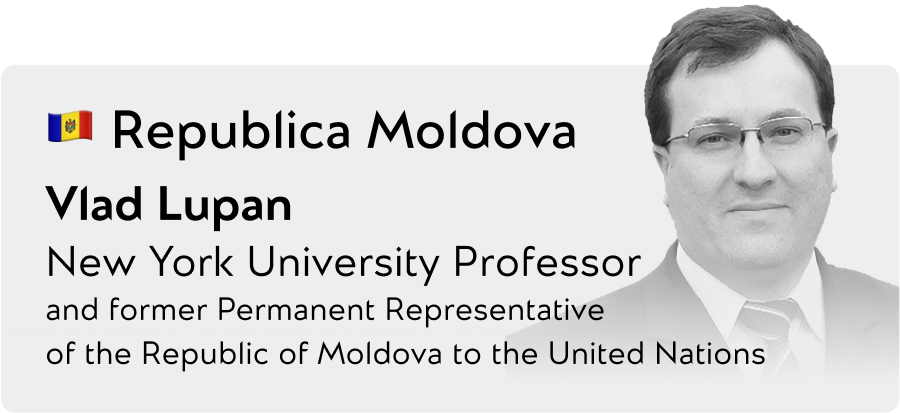
The return to the "Moldovan" language, and later openly to Romanian, was the main issue of our independence movement during Soviet Perestroika [reconstruction - TN]. The adoption of the Law on the Functioning of Languages in the Moldovan SSR in 1989 was one of the main steps in this direction (the law recognised "Moldovan" as the state language and Russian as the language of "interethnic communication" - ed.)
After gaining independence, schools no longer teach the "Moldovan" language invented by the Russians; now, school curricula include only one native language and literature - Romanian.
I recall a funny situation that happened to me around 2008-2009 when I was visiting Kyiv with a group of civil society experts. A Ukrainian journalist asked me how I felt about a statement by a Ukrainian politician about his concern about the Romanization of Moldovans. I replied that that was the same as asking about the attitude towards the Ukrainianization of Ukrainians.
So, the [full-scale] invasion of Ukraine took place when the cultural and linguistic identity of Moldovan society had already undergone a transformation. Nevertheless, the invasion contributed to the spread of the ideas described above.
At the same time, we still have parts of society influenced by Russian propaganda. This happens thanks to Russian-language television, which until recently was rebroadcast to Moldova. Recently, six of these channels were blocked (this refers to the decision of the Moldovan Committee for Emergency Affairs of December 17, which revoked the licenses of six TV channels. Four of them directly rebroadcast Russian broadcasts, and another two belonged to pro-Russian oligarch Ilan Shor - ed.)
The issues of cultural and linguistic identity still contain nuances, despite 30 years of independence and large waves of Moldovans who went to study in Romania. The reason is the Soviet brainwashing that lasted for more than 30 years. In addition, Russian propaganda and Kremlin puppets continued to work in the country after independence. Despite these nuances, we are witnessing a steady increase in the number of people in Moldova who speak Romanian as their first language. These changes are especially visible over long time periods thanks to censuses and sociological surveys.
The Republic of Sakha. Sofia (name changed for security reasons)
The Republic of Sakha is the largest administrative-territorial unit of the Russian Federation in the Far East. Prior to Russian expansion, Sakha was inhabited primarily by the Yakuts (82% of the population), as well as the Evenk, Even, and Yukaghir peoples. However, with the arrival of Russia, the indigenous population of the region was forcibly assimilated - now, Yakuts make up about 45% of the total population. Others are Russians.
Russians systematically exterminate non-ethnic Russians living in Russia. Russian racism against the indigenous peoples of North Asia has been going on for centuries. Russians considered indigenous people to be inferior, "lower", and "unworthy". Instead, being recognised as a Russian was considered a virtue.
When I told them that I was not a Russian but a Yakut, they called me a nationalist.
During the Soviet era, the Republic of Sakha experienced a huge cultural genocide and faced the rewriting of local history. And if we talk about decolonisation, the indigenous peoples of Sakha have been actively fighting for the destruction of Russian colonialism for centuries. This is one of the main reasons why Russia is now so suspicious of them and any movements or activities towards separation from Russia and independence.
But the Russian Federation did not stop at genocide: all memories of Russian colonial violence were erased during anti-religious campaigns, illiteracy campaigns, and executions of indigenous intellectuals.
Today, it is no longer easy to overcome the collective trauma of collectivisation, religious and political persecution, combined with the Soviet claims of modernity about the so-called "friendship of peoples." As a result, it is often difficult to convince people that their shared experiences of racism, poverty, unequal opportunities, and environmental problems are symptoms of Russian colonialism, not just individual problems.
Russia's unjustified claims that Ukraine allegedly "oppresses the Russian-speaking population" and the war showed that nothing had changed and Moscow's distrust of anything non-Russian could still lead to violence.
It has also revived anti-colonial thought in the Republic of Sakha and added more urgency and relevance to discussions of identity, language revitalisation, racism, the impact of the extractive economy on indigenous lands, and Moscow's unquestioned right to distribute all natural resource profits as it pleases.
I believe we are laying the groundwork because the Russian Moscow liberals are already discussing us in negative and often racist terms, revealing the true violent nature of the new Moscow Russian liberal leadership even before they come to power.
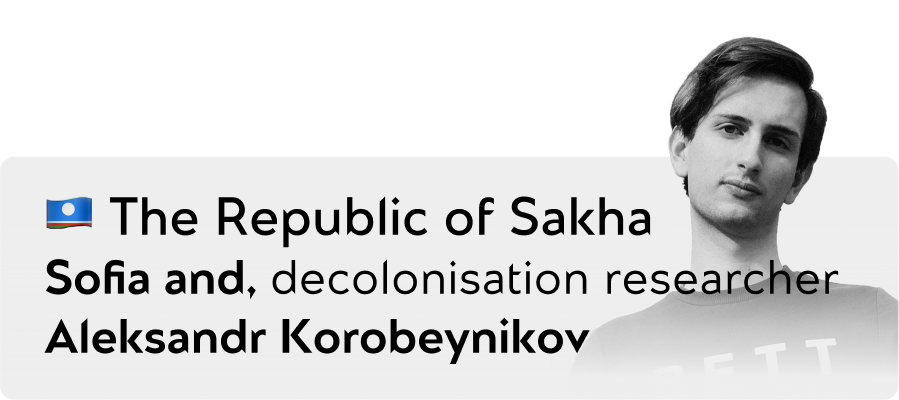
Decolonisation as a critical reflection on 'Russian' history, culture, and politics implies the obligatory condemnation of the colonial past and the return of subjectivity to those peoples whose historical and political representation has long been suppressed by the cultural and other influences of the allegedly dominant nation."
The national intelligentsia of the Sakha dreamed of national equality and the ability to make decisions about language, culture, traditions, and socioeconomic relations. However, the empire, Aleksandr says, hindered the development of national culture by imposing "universal" imperial cultural markers on all regions.
With the beginning of the full-scale invasion discussions about the decolonisation of what was considered a "Russian" field or space have gained unprecedented momentum.


